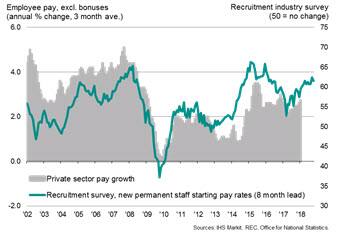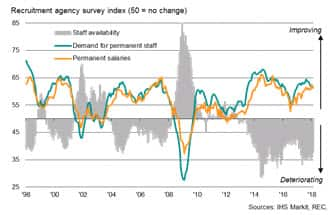Customer Logins
Obtain the data you need to make the most informed decisions by accessing our extensive portfolio of information, analytics, and expertise. Sign in to the product or service center of your choice.
Customer Logins
ECONOMICS COMMENTARY
Mar 21, 2018
UK pay growth hits 2½ year high
- Official data show employee earnings rising at fastest annual rate for nearly two-and-a-half years
- Employment rises more than expected
- Survey data highlight how tight labour market conditions are driving pay higher
Signs of accelerating pay growth raise the prospect of interest rates being hiked again in May.
News from the REC survey of recruitment companies, compiled by IHS Markit, that pay growth has picked up this year has been followed by official data confirming the upward earnings trend.
Data from the Office for National Statistics showed underlying pay growth (excluding bonuses) rising at an annual rate of 2.6% in the three months to January, the highest rate since November 2016. Total pay, including bonuses, was up 2.8% on a year ago, which is the fastest increase since September 2015 and takes pay growth above inflation for the first time in over a year.
UK pay growth: on the rise

Private sector pay growth accelerated to 3.0%. Excluding bonuses the increase was a more modest 2.7%, though that was still the fastest rate for more than a year. In the public sector, regular pay growth of 2.1% was the fastest since October 2012.
In a sign that companies remain optimistic about business conditions, employment grew by 168,000 in the three months to January. The unemployment rate meanwhile slipped back down to 4.3%, its joint-lowest since the 1970’s, underscoring the tightness of the labour market. As highlighted by the recent recruitment survey data, a lack of suitably skilled workers (and in some cases even unskilled staff) has meant employers are having to offer higher pay.
A long period of rising demand for staff has led to a sharp deterioration in staff availability

Rising pay is high on the Bank of England’s check list in terms of requirements for higher interest rates, alongside above target inflation, steady economic growth and reduced Brexit uncertainty. With inflation at 2.7%, the economy showing resilient growth in the first quarter, according to survey data, and the Brexit transition deal adding some certainty to business conditions over the next two years, the upturn in pay growth opens the door for policymakers keen to get some interest rates hikes under their belts.
{"items" : [
{"name":"share","enabled":true,"desc":"<strong>Share</strong>","mobdesc":"Share","options":[ {"name":"facebook","url":"https://www.facebook.com/sharer.php?u=http%3a%2f%2fwww.spglobal.com%2fmarketintelligence%2fen%2fmi%2fresearch-analysis%2fUK-pay-growth-hits-2-and-a-half-year-high.html","enabled":true},{"name":"twitter","url":"https://twitter.com/intent/tweet?url=http%3a%2f%2fwww.spglobal.com%2fmarketintelligence%2fen%2fmi%2fresearch-analysis%2fUK-pay-growth-hits-2-and-a-half-year-high.html&text=UK+pay+growth+hits+2%c2%bd+year+high","enabled":true},{"name":"linkedin","url":"https://www.linkedin.com/sharing/share-offsite/?url=http%3a%2f%2fwww.spglobal.com%2fmarketintelligence%2fen%2fmi%2fresearch-analysis%2fUK-pay-growth-hits-2-and-a-half-year-high.html","enabled":true},{"name":"email","url":"?subject=UK pay growth hits 2½ year high&body=http%3a%2f%2fwww.spglobal.com%2fmarketintelligence%2fen%2fmi%2fresearch-analysis%2fUK-pay-growth-hits-2-and-a-half-year-high.html","enabled":true},{"name":"whatsapp","url":"https://api.whatsapp.com/send?text=UK+pay+growth+hits+2%c2%bd+year+high http%3a%2f%2fwww.spglobal.com%2fmarketintelligence%2fen%2fmi%2fresearch-analysis%2fUK-pay-growth-hits-2-and-a-half-year-high.html","enabled":true}]}, {"name":"rtt","enabled":true,"mobdesc":"Top"}
]}




